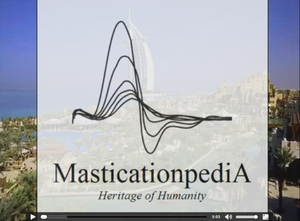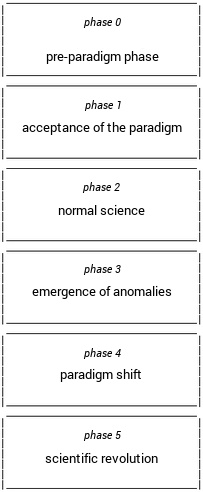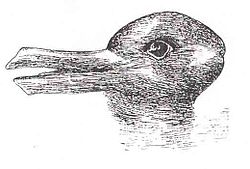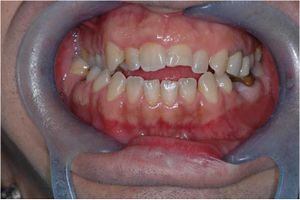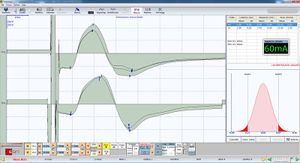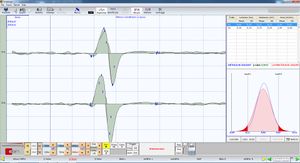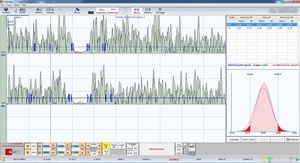Difference between revisions of "Introduction/zh"
Gianfranco (talk | contribs) (Created page with "介紹") |
(Updating to match new version of source page) |
||
| (22 intermediate revisions by one other user not shown) | |||
| Line 1: | Line 1: | ||
{{Bookind2}} | {{Bookind2}} | ||
| − | + | ||
<languages /> | <languages /> | ||
| − | '' | + | ''我們希望我們的讀者對將在 '''[[Masticationpedia]]''' 中辯論的話題有一個直接的認識; 我們將回顧一些關於一般科學的認識論演變的最新問題,特別是醫學和牙科醫學。 <br><br>為了您的方便,您還可以在 Youtube 上觀看 [https://youtube.com/playlist?list=PLYlmVJLgEzIeVdFudy_8VImh1x0riDiTc 視頻] '' |
<div style="display: inline-block; float:left; margin:0.3em; padding: 0.5em;"> | <div style="display: inline-block; float:left; margin:0.3em; padding: 0.5em;"> | ||
| − | <p class="titolo"><b> | + | <p class="titolo"><b>介紹</b></p> |
| − | [[File:Videospot.png|thumb|'''[https://youtube.com/playlist?list=PLYlmVJLgEzIeVdFudy_8VImh1x0riDiTc | + | [[File:Videospot.png|thumb|'''[https://youtube.com/playlist?list=PLYlmVJLgEzIeVdFudy_8VImh1x0riDiTc 咀嚼百科簡介]'''|link=https://youtube.com/playlist?list=PLYlmVJLgEzIeVdFudy_8VImh1x0riDiTc]] |
</div> | </div> | ||
| − | + | 在這個階段,我們將根據“庫恩範式”和“認識論”來考慮“科學進步”的兩個基本方面,後者質疑“統計推理”的概念 和“跨學科”。 | |
These two themes, which apparently seem to be in conflict with each other, as the first one needs ''disciplinarity'' to highlight the "Anomalies in the Paradigm" and the second needs "''Interdisciplinarity''", they will integrate through a resolving element that consists of "''metacognitive scaffolds''", i.e. cognitive bridges between specialist disciplines. In this context, therefore, the reader will be better able to appreciate the ''stochastic approach'' towards one of the most controversial topics in masticatory rehabilitations, such as, "'''Malocclusion'''", from which come most of the masticatory rehabilitation procedures such as orthodontics, prosthesis and orthognathic surgery. | These two themes, which apparently seem to be in conflict with each other, as the first one needs ''disciplinarity'' to highlight the "Anomalies in the Paradigm" and the second needs "''Interdisciplinarity''", they will integrate through a resolving element that consists of "''metacognitive scaffolds''", i.e. cognitive bridges between specialist disciplines. In this context, therefore, the reader will be better able to appreciate the ''stochastic approach'' towards one of the most controversial topics in masticatory rehabilitations, such as, "'''Malocclusion'''", from which come most of the masticatory rehabilitation procedures such as orthodontics, prosthesis and orthognathic surgery. | ||
| Line 19: | Line 19: | ||
{{ArtBy|autore=Gianni Frisardi}} | {{ArtBy|autore=Gianni Frisardi}} | ||
| − | ==Ab ovo<ref> | + | ==Ab ovo<ref>拉丁語“從一開始”</ref>== |
| − | + | 在進入 Masticationpedia 治療的核心之前,有一個前提是合適的,它主要涉及當前和前一個時代的社會、科學和臨床現實的兩個方面。 | |
| − | + | 在上個世紀,我們目睹了技術和方法“創新”的指數級增長,特別是在牙科領域<ref>{{cita libro | |
| autore = Heft MW | | autore = Heft MW | ||
| autore2 = Fox CH | | autore2 = Fox CH | ||
| Line 38: | Line 38: | ||
| DOI = 10.1177/2380084419879391 | | DOI = 10.1177/2380084419879391 | ||
| OCLC = | | OCLC = | ||
| − | }}</ref>; | + | }}</ref>; 這些創新在某種程度上影響了決策策略、觀點、思想流派和公理,以提高生活質量,如“21 世紀的暴露科學”所述<ref>{{cita libro |
| autore = | | autore = | ||
| autore2 = | | autore2 = | ||
| Line 57: | Line 57: | ||
| DOI = | | DOI = | ||
| OCLC = | | OCLC = | ||
| − | }}</ref>. | + | }}</ref>. 然而,這種指數增長隱含地帶來了概念灰色區域(實際上是“副作用”),這些區域有時被低估,但可能會質疑某些科學確定性或使它們不那麼絕對和更多概率。<ref>{{cita libro |
| autore = Liu L | | autore = Liu L | ||
| autore2 = Li Y | | autore2 = Li Y | ||
| Line 72: | Line 72: | ||
| OCLC = | | OCLC = | ||
}}</ref> | }}</ref> | ||
| − | [[File:The phases of paradigm change according to Thomas Kuhn.jpg|right|thumb| | + | [[File:The phases of paradigm change according to Thomas Kuhn.jpg|right|thumb|托馬斯·庫恩 (Thomas Kuhn) 的範式變化階段]] |
| − | + | 當前社會、科學和臨床現實的兩個敏感方面(似乎相互衝突,但正如我們將在本閱讀結尾處看到的那樣將是互補的)是庫恩所說的“科學進步”和“ 認識論”。 | |
| − | == | + | ==托馬斯庫恩的科學進步== |
| − | '''Thomas Kuhn''' in his most famous work states that ''science cyclically passes through some phases indicative of its operation''.<ref>Thomas Samuel Kuhn (Cincinnati, 18 | + | '''Thomas Kuhn''' in his most famous work states that ''science cyclically passes through some phases indicative of its operation''.<ref>Thomas Samuel Kuhn (Cincinnati, 18 七月 1922 – Cambridge, 17 六月 1996) 是一位美國科學哲學家.<br>看 Treccani, ''[http://www.treccani.it/enciclopedia/thomas-samuel-kuhn/ Kuhn, Thomas Samuel]''. Wikipedia, ''[[:wikipedia:Thomas Kuhn|Thomas Kuhn]]''. |
</ref><ref>{{cita libro | </ref><ref>{{cita libro | ||
| autore = Kuhn Thomas S | | autore = Kuhn Thomas S | ||
| Line 110: | Line 110: | ||
| | | | ||
| | | | ||
| − | *<u>''''' | + | *<u>'''''階段 5'''''</u>, or the '''Scientific Revolution'''<br>Phase 5 deals with the (scientific) revolution. In the period of extraordinary scientific activities, a discussion will open within the scientific community on which new paradigm to accept. But it will not necessarily be the most "true" or most efficient paradigm to come to the fore, but the one that will be able to capture the interest of a sufficient number of scientists and to gain the trust of the scientific community. <br>The paradigms that participate in this clash, according to Kuhn, share nothing, not even the bases and, therefore, are not comparable (they are "immeasurable"). The paradigm is chosen, as said, on socio-psychological or biological basis (young scientists replace older ones). The battle between paradigms will resolve the crisis, the new paradigm will be named and science will be brought back to Phase 1. <br>For the same principle of Phase 4, Masticationpedia will propose, in the chapter titled ''Extraordinary science'', a '''new paradigmatic model in the field of rehabilitation of the Masticatory System''' discussing its principles, motivations, clinical scientific experiences and, above all, a ''radical change'' in the field of medical diagnostics. This change is essentially based on '''System Inference''', rather than on Symptom Inference, giving mainly absolute value to the objectivity of the data. |
|} | |} | ||
It is almost obvious that Kuhnian scientific philosophy prefers disciplinarity, as an anomaly in the genomic paradigm will be noticed better by a geneticist than by a neurophysiologist. Now this concept would seem to be in contrast with the epistemological evolution of Science, so it is better to stop a minute upon it in detail. | It is almost obvious that Kuhnian scientific philosophy prefers disciplinarity, as an anomaly in the genomic paradigm will be noticed better by a geneticist than by a neurophysiologist. Now this concept would seem to be in contrast with the epistemological evolution of Science, so it is better to stop a minute upon it in detail. | ||
| − | == | + | ==認識論== |
<center> | <center> | ||
{| | {| | ||
|- | |- | ||
| − | | width="250" align="right" |<small>'' | + | | width="250" align="right" |<small>''黑天鵝象徵著認識論的歷史問題之一:如果我們迄今為止看到的所有天鵝都是白色的,我們是否可以決定所有的天鵝都是白色的?<br>Really?''</small> |
| align="center" |[[File:Black_Swan_(Cygnus_atratus)_RWD.jpg|175px|center]] | | align="center" |[[File:Black_Swan_(Cygnus_atratus)_RWD.jpg|175px|center]] | ||
|- | |- | ||
| Line 131: | Line 131: | ||
---- | ---- | ||
| − | ''' | + | '''認識論'''(來自希臘語ἐπιστήμη,''epistème'',“某些知識”或“科學”,以及λόγος,''logos''',“演講”)是哲學的一個分支,它處理 獲得科學知識的條件以及獲得這些知識的方法。<ref>這個詞被認為是由蘇格蘭哲學家詹姆斯弗雷德里克費里爾在他的“形而上學研究所”中創造的 (p.46), of 1854; see Internet Encyclopedia of Philosophy, ''[https://www.iep.utm.edu/ferrier/ James Frederick Ferrier (1808—1864)]''. [[:wikipedia:James Frederick Ferrier|Wikipedia]]</ref> The term specifically indicates that part of gnoseology which studies the foundations, validity and limits of scientific knowledge. In English-speaking countries, the concept of epistemology is instead mainly used as a synonym for gnoseology or knowledge theory — the discipline that deals with the study of knowledge. |
Incidentally, the basic problem of epistemology today, as in Hume’s time, remains that of verifiability.<ref>[[:wikipedia:David Hume|David Hume]] (Edimburgh, 7 may 1711 – Edimburgh, 25 august 1776) was a Scottish philosopher. He is considered the third and perhaps the most radical of the British Empiricists, after the Englishman John Locke and the Anglo-Irish George Berkeley.</ref><ref>{{cita libro | Incidentally, the basic problem of epistemology today, as in Hume’s time, remains that of verifiability.<ref>[[:wikipedia:David Hume|David Hume]] (Edimburgh, 7 may 1711 – Edimburgh, 25 august 1776) was a Scottish philosopher. He is considered the third and perhaps the most radical of the British Empiricists, after the Englishman John Locke and the Anglo-Irish George Berkeley.</ref><ref>{{cita libro | ||
Latest revision as of 16:11, 20 January 2022
我們希望我們的讀者對將在 Masticationpedia 中辯論的話題有一個直接的認識; 我們將回顧一些關於一般科學的認識論演變的最新問題,特別是醫學和牙科醫學。
為了您的方便,您還可以在 Youtube 上觀看 視頻
介紹
在這個階段,我們將根據“庫恩範式”和“認識論”來考慮“科學進步”的兩個基本方面,後者質疑“統計推理”的概念 和“跨學科”。
These two themes, which apparently seem to be in conflict with each other, as the first one needs disciplinarity to highlight the "Anomalies in the Paradigm" and the second needs "Interdisciplinarity", they will integrate through a resolving element that consists of "metacognitive scaffolds", i.e. cognitive bridges between specialist disciplines. In this context, therefore, the reader will be better able to appreciate the stochastic approach towards one of the most controversial topics in masticatory rehabilitations, such as, "Malocclusion", from which come most of the masticatory rehabilitation procedures such as orthodontics, prosthesis and orthognathic surgery.
So, in addition to anticipating the scientific and philosophical aspect of Masticationpedia, we will finally focus on topics such as "Complex Systems", the "Emergent Behaviour" of Complex Systems and "System’s Coherence": necessary steps to introduce scientific clinical topics which bring with them doubts, questions and at the same time paradigmatic innovations tending to change the status quo of the deterministic and reductionist clinical thinking routine, before a stochastic and interdisciplinary language logic.
Article by Gianni Frisardi
|
Ab ovo[1]
在進入 Masticationpedia 治療的核心之前,有一個前提是合適的,它主要涉及當前和前一個時代的社會、科學和臨床現實的兩個方面。
在上個世紀,我們目睹了技術和方法“創新”的指數級增長,特別是在牙科領域[2]; 這些創新在某種程度上影響了決策策略、觀點、思想流派和公理,以提高生活質量,如“21 世紀的暴露科學”所述[3]. 然而,這種指數增長隱含地帶來了概念灰色區域(實際上是“副作用”),這些區域有時被低估,但可能會質疑某些科學確定性或使它們不那麼絕對和更多概率。[4]
當前社會、科學和臨床現實的兩個敏感方面(似乎相互衝突,但正如我們將在本閱讀結尾處看到的那樣將是互補的)是庫恩所說的“科學進步”和“ 認識論”。
托馬斯庫恩的科學進步
Thomas Kuhn in his most famous work states that science cyclically passes through some phases indicative of its operation.[5][6] According to Kuhn, science is paradigmatic, and the demarcation between science and pseudoscience can be traced back to the existence of a paradigm. The evolution of scientific progress is assimilated to a continuous curve which undergoes discontinuity in paradigm changes. For example, in phase 2 of the Kuhn Paradigms, called Normal Science, scientists are seen as problem solvers, who work to improve the agreement between the paradigm and nature.
This phase, in fact, is based on a set of basic principles dictated by the paradigm, which are not questioned but which, indeed, are entrusted with the task of indicating the coordinates of the works to come. In this phase, the measuring instruments with which the experiments are made are developed, most of the scientific articles are produced and its results constitute significant growth in scientific knowledge. In the normal science phase both successes and failures will be achieved; the failures are called by Kuhn anomalies, or events that go against the paradigm.
As a good problem solver, the scientist tries to solve these anomalies.
Kuhn's phases in Dentistry
Kuhn, however, divides the evolution of a paradigm into five phases; this is a fundamental process for Masticationpedia, but to keep tuned with the project, we will limit ourselves to describing the two most significant phases:
| |
|
It is almost obvious that Kuhnian scientific philosophy prefers disciplinarity, as an anomaly in the genomic paradigm will be noticed better by a geneticist than by a neurophysiologist. Now this concept would seem to be in contrast with the epistemological evolution of Science, so it is better to stop a minute upon it in detail.
認識論
| 黑天鵝象徵著認識論的歷史問題之一:如果我們迄今為止看到的所有天鵝都是白色的,我們是否可以決定所有的天鵝都是白色的? Really? |
|
| Kuhn used optical illusion to demonstrate how a paradigm shift can cause a person to see the same information in a completely different way: which animal is the one here aside? Sure? |
'認識論(來自希臘語ἐπιστήμη,epistème,“某些知識”或“科學”,以及λόγος,logos,“演講”)是哲學的一個分支,它處理 獲得科學知識的條件以及獲得這些知識的方法。[7] The term specifically indicates that part of gnoseology which studies the foundations, validity and limits of scientific knowledge. In English-speaking countries, the concept of epistemology is instead mainly used as a synonym for gnoseology or knowledge theory — the discipline that deals with the study of knowledge.
Incidentally, the basic problem of epistemology today, as in Hume’s time, remains that of verifiability.[8][9]
The Hempel paradox tells us that each sighted white swan confirms that crows are black[10]; that is, each example not in contrast with the theory confirms a part of it:
According to the objection of falsifiability, instead, no theory is ever true because, while there are only a finite number of experiments in favour, there is also theoretically an infinite number that could falsify it.[11]
|
But it’s not all so obvious... |
...because the very concept of epistemology meets continuous implementations, like in medicine:
|
|
P-value vs. Interdisciplinarity
Given the above, on a superficial view of the epistemic evolution of the Science, the two aspects of disciplinarity ("Physics Paradigm of Science", highlighting the anomaly) and Interdisciplinary ("Engineering Paradigm of Science", metacognitive scaffold), might seem to be in conflict with each other; in reality, however, as we are just going to see right in this chapter, they are two sides of the same coin because both tend to generate "Paradigmatic Innovation" without any conflict at all.
Now we could conclude that the "Innovations" are already "Progress of Science" in themselves, as stated in the article "Scientific basis of dentistry" by Yegane Guven, in which the effect of biological and digital revolutions is considered on dental education and daily clinical practice, such as personalized regenerative dentistry, nanotechnologies, virtual reality simulations, genomic information and stem cell studies.[21] The innovations mentioned by Guven are obviously to be considered as technological and methodological in nature; however, the Progress of Science does not move forward with this kind of Innovations, which are called "Incremental Innovations" and "Radical Innovations", but it occurs substantially through "Paradigmatic Innovations".
In the strictest sense of the phrase, "Paradigmatic Innovations" are essentially a change of thought and awareness that pervades the whole of humanity, starting from different social strata, from the Copernican scientific revolution to the current trend of Stochastic approach to the biological phenomenon[22].
In this epistemological context (in addition to other initiatives such as the Research Diagnostic Criteria in the field of the Temporomandibular Disorders — RDC/TMDs), of the Evidence Based Medicine (and other), the Masticationpedia project inserts itself in order to highlight the dialectics dynamism about the progress of the masticatory rehabilitation science. Masticationpedia tends, moreover, to highlight the anomalies that inevitably stimulate a change of thought and therefore a "Paradigmatic Innovation".
Before proceeeding, it could be appropriate to observe a very concrete and significant case.
Malocclusion
Malocclusion: it literally means a bad (malum, in Latin) closure of the dentition[23]. The closure is easy to understand, we believe, but the epithet "bad" must be understood with care as well, because it is not as simple as it seems.
To briefly grasp the concept, in this first introductory reading we will try to present a simple but highly debatable question that involves a series of other questions in the field of masticatory rehabilitation and especially in orthodontic disciplines: what is "Malocclusion"? Bear in mind that in 2019, a Pubmed query about this term returned a result of "only" 33,309 articles[24], which says it all about the hypothetical terminological agreement on the subject; and, therefore, very meaningful conclusions could be drawn every now and then from these articles, such as the ones we reproduce in full from an article by Smaglyuk and collaborators, a somewhat "sensational" article that deals with the interdisciplinary approach in the diagnosis of malocclusions[25]:
Another noteworthy fact is that if in the same 2019 Pubmed was questioned on interdisciplinarity in the diagnosis of malocclusions, the result dropped drastically to just four articles[26].
These premises to the "Malocclusion” question indicate, on one hand, an alert about anomalies that tend to activate Kuhn phase 4 and, on the other, a bifurcation in the epistemic choice on the subject: one that generates Incremental Innovations (others 33,309 articles, perhaps) and another that prefers a new gnoseological path of "Paradigmatic Innovation”.
Let’s try to approach part of the concept that considers the "Paradigmatic Innovation” as essential, asking ourselves for example:
|
What does "Malocclusion" mean? |
We will answer this question by reporting a clinical case of evident “Malocclusion”.
Patient is with an occlusion that orthodontists call “Malocclusion” because it has a posterior unilateral crossbite and anterior openbite[27]; it is a malocclusion that can be treated with a fixed orthodontic therapy and possibly in combination with an orthognathic intervention[28]. Crossbite is another element of disturbance in normal occlusion because of which it is obligatorily treated together with the openbite[29][30][31].
It is self-evident that an observer with a deterministic mindset facing a phenomenon of such evident occlusal incongruity considers crossbite and openbite the cause of malocclusion (cause/effect) or vice versa; and it is obvious, as well, that the observer recommends an orthodontic treatment to restore a “Normocclusion”. This way of reasoning means that the model (masticatory system) is “normalized to occlusion”; and if read backwards, it means that the occlusal discrepancy is the cause of malocclusion and, therefore, of disease of the Masticatory System. (Figure 1a).
But let's hear what the two players say, the dentist and the patient, in the informative dialogue.
| The dentist tells the patient that he is suffering from severe malocclusion and that it should be treated to improve its aesthetics and chewing function. The patient, however, replies firmly: «No way, I haven't the slightest idea to do it at all, doctor, because I might even have an unrepresentative smile, but I eat very well.» The dentist’s reply is ready, so the practitioner insists by saying: «but you have a serious malocclusion with an openbite and a unilateral posterior crossbite, you should already have problems with bruxism and swallowing, as well as posture.» The patient closes the confrontation in a decisive way: «absolutely false: I chew very well, I swallow very well and at night I snore alot so I don’t grind; besides, I’m a sportsman and I don’t have any postural disturbance». |
Now the conclusion remains very critical because we might be finding ourselves in front of a verbal language of the patient which is misleading because it is not specific and does not respond to a detailed physiopathogenetic knowledge of the occlusal state; or, paradoxically, we are otherwise facing a machine language converted into verbal language which guarantees the integrity of the system. At this point the situation is truly embarrassing because neither the patient nor the observer (dentist) will be able to say with certainty that the System is in a “Malocclusion” state.
It is precisely at this moment that one remembers the criticism of the American Statistician Association titled “Statistical inference in the 21st century: A World Beyond p <0.05”, which urges the researcher to accept uncertainty, be sensible reflective, open and modest in his statements[16]: which basically translates into a search for interdisciplinarity.
Interdisciplinarity, in fact, could answer such a complex question; but it is nonetheless necessary to interpret the biological phenomenon of "“Malocclusion”" with a stochastic forma mentis of which we will discuss in detail later.
A stochastic observer may observe that there is a low probability that the patient, at the moment , is in a state of occlusal disease, as the patient's natural language indicates ideal psychophysical health; he/she then concludes that the occlusal discrepancy could not be a cause of neuromuscular and psychophysical functional disorder. In this case, therefore, the Masticatory System can not only be normalized to the occlusion only, but a more complex model is needed too, so it has to be normalized to the Trigeminal Nervous System. The patient was then served a series of trigeminal electrophysiological tests to assess the integrity of his/her Trigeminal Nervous System in these “"Malocclusion”" clinical conditions.
We can see the following output responses, which we report directly in figures 1b, 1c and 1d (with explanation in the caption, to simplify the discussion). These tests and their description by now should only be considered as “Conceptual Rationale” for the “Malocclusion” question; later they will be widely described and their analysis detailed in the specific chapters. It can already be noted in this first descriptive approach to the masticatory phenomenon that there is an evident discrepancy between the occlusal state (which at first would support the orthodoxy of classical orthodontics in considering it as “Malocclusive State”) and the neurophysiological data indicating incredible synchronization and perfect symmetry of the trigeminal reflexes.
These results can be attributed to anything less than a "malocclusion": we are obviously in front of an error of the logic Language in medicine, in this case it is in fact more appropriate to talk about...
|
Occlusal dysmorphism and not Malocclusion (which, as we shall see a little further on, is quite another thing) |
Conclusion
Even before drawing conclusions, conceptual clarity must be made on some fundamental points which of course will be treated in detail in the specific chapters of Masticationpedia.
The Masticatory System should be considered as a “Complex System”[32], not as a Biomechanical System focused exclusively on dental occlusion, because in this sense the “Occlusion” is nothing more than a subset of the Complex System interacting with the other subsets, such as periodontal receptors, neuromuscular spindles, recruitment of motor units, central nervous system, temporomandibular joint, etc., to give shape to an “Emerging Behaviour”, the masticatory one.
The peculiarity of this concept is that it is not possible to interpret or predict the “Emerging Behaviour” of a System by extracting objective data from a single subset. Instead, the integrity of the System must be quantified in its entirety, and only then can a segmentation of the whole be attempted to make an analytical description of the node itself. There are very important intellectual and scientific movements that are engaging with this issue; in this regard, the extraordinary work of Prof. Kazem Sadegh-Zadeh: Handbook of Analytic Philosophy of Medicine comes to mind.[33]
In the presented case, the question is resolved in the following language logic:
- The subsets of the Masticatory System (teeth, occlusion, Temporomandibular joints, muscles, etc.) are in a state of "Coherence” with the Central Trigeminal Nervous System (see figures 1b, 1c and 1d), so the term “Malocclusion” cannot be used, the phrase “Occlusal Dismorphism” should be considered instead.
- «This does not mean abolishing prosthetic, orthodontic and orthognathic masticatory rehabilitation treatments: on the contrary, this forma mentis tends to restore medical knowledge to dental rehabilitation disciplines, as well as offering an alternative to the scientific reductionism that converges in a deterministic interpretation of the biological phenomenon.»
Going beyond the specialist perimeters of the disciplines, as previously reported on interdisciplinarity, helps expanding the diagnostic and therapeutic models as it can be seen in the clinical Case in which a patient was treated with the OrthoNeuroGnathodontic method is reported.
In this way, an overall view of the entire Masticatory System is presented in order to gather the aesthetic and functional-neurophysiological components together to determine “Occlusal Stability” and to avoid “Relapses”, especially in orthodontic and orthognathic treatments.[34][35]
These are just some of the topics that will be covered extensively both in this chapter and in what we call “Extraordinary Science”. Meanwhile, in a fitting diversion our colourful friend Linus Sapiens, the little yellow man on the left, asks us:
(Not a trivial question, let's start talking, then, about the logic of medical language)
- ↑ 拉丁語“從一開始”
- ↑ Heft MW, Fox CH, Duncan RP, «Assessing the Translation of Research and Innovation into Dental Practice», in JDR Clin Trans Res, 2019.
DOI:10.1177/2380084419879391 - ↑ «Exposure Science in the 21st Century. A Vision and a Strategy», Committee on Human and Environmental Exposure Science in the 21st Century; Board on Environmental Studies and Toxicology; Division on Earth and Life Studies; National Research Council..
ISBN: 0-309-26468-5 - ↑ Liu L, Li Y, «The unexpected side effects and safety of therapeutic monoclonal antibodies», in Drugs Today, 2014, Barcellona.
DOI:10.1358/dot.2014.50.1.2076506 - ↑ Thomas Samuel Kuhn (Cincinnati, 18 七月 1922 – Cambridge, 17 六月 1996) 是一位美國科學哲學家.
看 Treccani, Kuhn, Thomas Samuel. Wikipedia, Thomas Kuhn. - ↑ Kuhn Thomas S, «The Structure of Scientific Revolutions», Univ. of Chicago Press, 2012, Chicago.
ISBN: 9780226458113 - ↑ 這個詞被認為是由蘇格蘭哲學家詹姆斯弗雷德里克費里爾在他的“形而上學研究所”中創造的 (p.46), of 1854; see Internet Encyclopedia of Philosophy, James Frederick Ferrier (1808—1864). Wikipedia
- ↑ David Hume (Edimburgh, 7 may 1711 – Edimburgh, 25 august 1776) was a Scottish philosopher. He is considered the third and perhaps the most radical of the British Empiricists, after the Englishman John Locke and the Anglo-Irish George Berkeley.
- ↑ Srivastava S, «Verifiability is a core principle of science», in Behav Brain Sci, Cambridge University Press, 2018, Cambridge.
DOI:10.1017/S0140525X18000869 - ↑ Here we obviously refer to the well-known paradox called "of the crows", or "of the black crows", formulated by the philosopher and mathematician Carl Gustav Hempel, better explained in Wikipedia's article Raven paradox:
See Good IJ, «The Paradox of Confirmation», in Br J Philos Sci, 1960 – in Vol. 11. - ↑ Evans M, «Measuring statistical evidence using relative belief», in Comput Struct Biotechnol J, 2016.
DOI:10.1016/j.csbj.2015.12.001 - ↑ Amrhein V, Greenland S, McShane B, «Scientists rise up against statistical significance», in Nature, 2019.
DOI:10.1038/d41586-019-00857-9 - ↑ Rodgers JL, «The epistemology of mathematical and statistical modeling: a quiet methodological revolution», in Am Psychol, 2010.
DOI:10.1037/a0018326 - ↑ Meehl P, «The problem is epistemology, not statistics: replace significance tests by confidence intervals and quantify accuracy of risky numerical predictions», 1997. , in eds Harlow L. L., Mulaik S. A., Steiger J. H., What If There Were No Significance Tests? - editors. (Mahwah: Erlbaum, 393–425. [Google Scholar]
- ↑ Sprenger J, Hartmann S, «Bayesian Philosophy of Science. Variations on a Theme by the Reverend Thomas Bayes», Oxford University Press, 2019, Oxford.
- ↑ 16.0 16.1 16.2 Wasserstein RL, Schirm AL, Lazar NA, «Moving to a World Beyond p < 0.05», in Am Stat, 2019.
DOI:10.1080/00031305.2019.1583913 - ↑ Dettweiler Ulrich, «The Rationality of Science and the Inevitability of Defining Prior Beliefs in Empirical Research», in Front Psychol, 2019.
DOI:10.3389/fpsyg.2019.01866 - ↑ European Union, Horizon 2020
- ↑
Boon M, Van Baalen S, «Epistemology for interdisciplinary research - shifting philosophical paradigms of science», in Eur J Philos Sci, 2019.
DOI:10.1007/s13194-018-0242-4 - ↑ Boon M, «An engineering paradigm in the biomedical sciences: Knowledge as epistemic tool», in Prog Biophys Mol Biol, 2017.
DOI:10.1016/j.pbiomolbio.2017.04.001 - ↑ Guven Y, «Scientific basis of dentistry», in J Istanb Univ Fac Den, 2017.
PMID:29114433 - PMCID:PMC5624148
DOI:10.17096/jiufd.04646 - ↑ Zhao XF, Gojo I, York T, Ning Y, Baer MR, «Diagnosis of biphenotypic acute leukemia: a paradigmatic approach», in Int J Clin Exp Pathol, 2010.
PMID:19918331 - PMCID:PMC2776262 - ↑ The creation of the term is generally attributed to Edward Angle, considered the father of modern orthodontics, who coined it as a specification of occlusion to signal the incorrect opposition in closing of the lower teeth and upper, especially the first molar (Wikipedia); see Gruenbaum T, «Famous Figures in Dentistry», in Mouth – JASDA, 2010.
- ↑ Pubmed, Malocclusion
- ↑ Smaglyuk LV, Voronkova HV, Karasiunok AY, Liakhovska AV, Solovei KO, «Interdisciplinary approach to diagnostics of malocclusions (review)», in Wiad Lek, 2019.
- ↑ Pubmed, interdisciplinary diagnostics of malocclusions
- ↑ Littlewood SJ, Kandasamy S, Huang G, «Retention and relapse in clinical practice», in Aust Dent J, 2017.
DOI:10.1111/adj.12475 - ↑ Reichert I, Figel P, Winchester L, «Orthodontic treatment of anterior open bite: a review article--is surgery always necessary?», in Oral Maxillofac Surg, 2014.
DOI:10.1007/s10006-013-0430-5 - ↑ Miamoto CB, Silva Marques L, Abreu LG, Paiva SM, «Impact of two early treatment protocols for anterior dental crossbite on children’s quality of life», in Dental Press J Orthod, 2018.
- ↑ Alachioti XS, Dimopoulou E, Vlasakidou A, Athanasiou AE, «Amelogenesis imperfecta and anterior open bite: Etiological, classification, clinical and management interrelationships», in J Orthod Sci, 2014.
DOI:10.4103/2278-0203.127547 - ↑ Mizrahi E, «A review of anterior open bite», in Br J Orthod, 1978.
- ↑ Complex system in Wikipedia
- ↑ Sadegh-Zadeh Kazem, «Handbook of Analytic Philosophy of Medicine», Springer, 2012, Dordrecht.
ISBN: 978-94-007-2259-0
DOI:10.1007/978-94-007-2260-6 - ↑ Al-Moraissi EA, Wolford LM, «Is Counterclockwise Rotation of the Maxillomandibular Complex Stable, Compared With Clockwise Rotation, in the Correction of Dentofacial Deformities? A Systematic Review and Meta-Analysis», in J Oral Maxillofac Surg, 2016.
DOI:10.1016/j.joms.2016.06.001 - ↑ Hoffmannová J, Foltán R, Vlk M, Klíma K, Pavlíková G, Bulik O, «Factors affecting the stability of bilateral sagittal split osteotomy of a mandible», in Prague Med Rep, 2008.
PMID:19537679
particularly focusing on the field of the neurophysiology of the masticatory system
